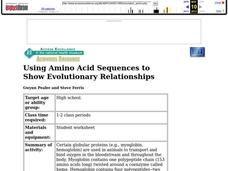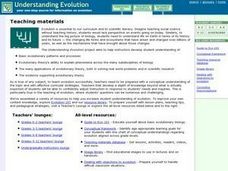Howard Hughes Medical Institute
Using DNA to Explore Lizard Phylogeny
In a fun and interactive two-day lesson, learners sort anole lizard pictures by appearance. Next, they watch a video about the anoles and re-sort based on the information in the video. In addition to physical characteristics, budding...
Curated OER
AP: Chapter 25: Phylogeny and Systematics
As a review or note taking guide, this resource wraps up a unit on the tree of life. Biology bigwigs define phylogeny and answer questions about the subsequent classification of organisms. The worksheet takes a straightforward and...
Curated OER
Systematics and the Phylogenetic Revolution
This assignment conducts a thorough exploration of systematics. Clearly designed for an AP biology course, questions pertain to taxonomic categories, phylogeny, and construction of cladograms.
Curated OER
Phylogeny
Here is an unusual collection of slides. The first, which is upside down, is the phylogeny of fish. Next comes an article about invasive lampreys in the Great Lakes area. The third slide shows the life cycle of sea lampreys. A reptilian...
Curated OER
Using Amino Acid Sequences to Show Evolutionary Relationships
Compare protein fragments, count amino acids, and use the information to explore common ancestry. The resource mentions a student worksheet, however, a separate printable worksheet is not provided. The exercises are written into the...
Curated OER
Molecular Biology and Primate Phylogenetics
Pairs of high school biologists compare amino acid differences in the beta hemoglobin of different primates. They use the information collected to construct a phylogenic tree. Follow-up discussion questions are provided. This is a...
Curated OER
Making Cladograms
Students construct cladograms (evolutionary trees), showing how shared derived characters can be used to reveal degrees of relationship. They interpret and analyze cladograms, and determine where unclassified vertebrates would fit on a...
Curated OER
Modern Classification
In this modern classification worksheet, 9th graders describe ways scientists determine an organism's phylogeny. Then they explain what the animal and fungi kingdoms have in common and how they differ. Students also classify some cells...
Curated OER
An Automobile Phylogenetic Tree
Students construct a phylogenetic tree for various automobiles and trucks after considering important characteristics of these "organisms". They work in small groups to construct the trees and complete a set of questions then they...
Alabama Learning Exchange
The Tree of Life
Young scientists use the Internet to evaluate how organisms are classified. They research the phylogeny of organisms and how they are linked in a certain way. Pupils hone research technology skills with their final presentations.
Curated OER
Taxonomy
Students complete a short quiz reviewing classification. In groups, they create their own family trees and discuss who is related to whom and are introduced to phylogenies in genetics. To end the lesson, they take notes on Taxonomy and...
Curated OER
Plant Phylogeny
Students examine live potted plants and create a hypothesis regarding their relationships in this upper-level introductory lesson on phylogenetic reconstruction using morphological characters. The lesson can be accomplished in...
Curated OER
Anolis Lizards of the Greater Antilles
Students "take a trip" to the Greater Antilles to observethe Anolis lizards. They study the body structures and habitat of different species, then plot this data on a map to look for patterns in their distribution. From the patterns they...














